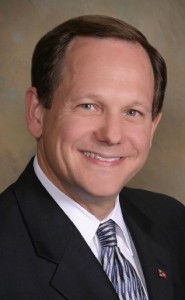SAINT LOUIS – In the wake of a contentious debate in city hall on the awarding of a contract to advise the water department, Mayor Francis Slay is exploring ways to modernize the city’s government in ways that he says would streamline bureaucracy and which could potentially alter the power of the Board of Aldermen and the Mayor’s office.
In recent weeks, Mayor Slay has directed the City Counselor to examine the city charter. According to Slay’s Chief of Staff, Jeff Rainford, the current charter is from a “bygone era,” when “corruption was absolutely rampant, worse than anything we can imagine.”
Rainford’s position is that the process for Slay to make decisions and execute his agenda is bogged down by bureaucratic mechanisms uncommon in most modern governments.
“The [St. Louis City] Board of Alderman can’t initiate a budget, the Board of Estimate and Apportionment does that,” Rainford told The Missouri Times. “What other

legislative body has that? People assume the Mayor or the Board of Aldermen gets to make some of these decisions that are actually up to the Board of Estimate that nobody has ever heard of!”
Board of Aldermen member Lyda Krewson agreed with Rainford, saying she felt that the charter, as well as several other “common practices,” should be reexamined moving forward.
“Most local governments rely on a pretty straightforward, three branches of government we all learned about,” Krewson said. “So the Board of E&A is something we don’t see in other places. I do think our government and our constituents would fare better if we looked at more progressive ways to run city government.”
The Board of Estimate was created, according to Rainford, at a time when power had to be as diffused as possible among leadership. But today, with the need for faster decision-making and more transparency in government, Rainford says it’s time to examine some of the arcane city practices like the Board of Estimate and Apportionment.
The three-person Board can prove to be a hurdle for Slay. The Mayor is on the board. His fellow Board members include Board of Aldermen President Lewis Reed, who fought a long ultimately unsuccessful primary against Slay last spring, and City Comptroller Darlene Green, relatively unknown to most city residents.
It was during the approval contract for a contract to improve the city’s water system that Slay’s frustration, became clear. Veolia was set to receive a contract from the city to advise the water department on keeping rates low and water quality high amid concerns that the city water system was functioning poorly.
Veolia’s track record, both as being environmentally friendly and in relation to their projects in the Israel and Palestine region, was called into question. Reed raised the issue during his failed mayoral bid, and Green joined his opposition. The deal was effectively halted when Veolia withdrew its request amid growing pressure from the public and increasingly hostile hearings before the Board of Estimate
Slay and his staff contend that such extra governmental bodies aren’t necessary with the Board of Aldermen and the Mayor’s office already in place. Rainford points to the ballot measure which put authority over the city’s police department under the Mayor’s purview for the first time since the Civil War, as an example of citizens seeing the need for “modernization” of the city charter, and the Mayor’s duties.
“The power over the city police department was given to Jefferson City during the Civil War and it was because of the divisive politics of that time,” Rainford said. “And the [Board of Estimate] is the same thing, a totally dated check in a system that isn’t needed anymore.”
Tom Shepard, chief of staff to Reed, says that Slay’s newest interest in modernizing government is one based in self-interest, not the best interests of the city.
“Anything that reduces transparency and accountability, we’re going to be firmly against,” Shepard said. “And when the Mayor comes out and says things like, the budget director should work under his authority, that’s not modernization. The budget director works for the Board of Estimate, why should they work for the Mayor? Why shouldn’t they work for a three-person board that doesn’t have an agenda?”
Reed and his staff have implied Slay’s interest in “modernizing” the contract approval process comes from his own anger that he “didn’t get what he wanted.”
“It was clear that this contract, for some reason, was important to the Mayor, and despite all the issues with the bid and with their credentials, he just pushed it and pushed it and pushed it,” Shepard said. “I don’t know why that is, but then when he doesn’t get the contract he wants, suddenly he wants to make it easier for him to sign contracts. You tell me what that means.”
While Shepard said they were opposed to any changes that added authority to the Mayor with no clear benefit, Slay’s staff contends Reed’s objection to the Veolia contract is merely political. One source inside the mayor’s office said Reed was personally favoring the contract of a separate company, Johnson Controls, for the water contract, and called Reed’s objection to Veolia, “hypocritical.”
“He’s over here pushing Johnson Controls, and this is a company with plenty of environmental violations,” the source said. “That’s just hypocrisy. Veolia has had some issues like any major company, but Johnson Controls isn’t some perfect business with a clean record.”
Like Veolia, Johnson Controls has been accused of environmental wrongdoing, with fines related to its asbestos removal operations. The Occupational Health and Safety Administration (OSHA) also cited the company for allegedly exposing thousands of employees to toxic lead at its battery factories across the globe.
Shepard flatly denied Reed had a preference, saying he never supported or privately pushed for Johnson Controls.
Slay’s staff currently maintains they are looking into what “common practices” in the city government can be changed or addressed. Any change to the city government which would require a change to the charter would have to be approved by a vote of the people.



